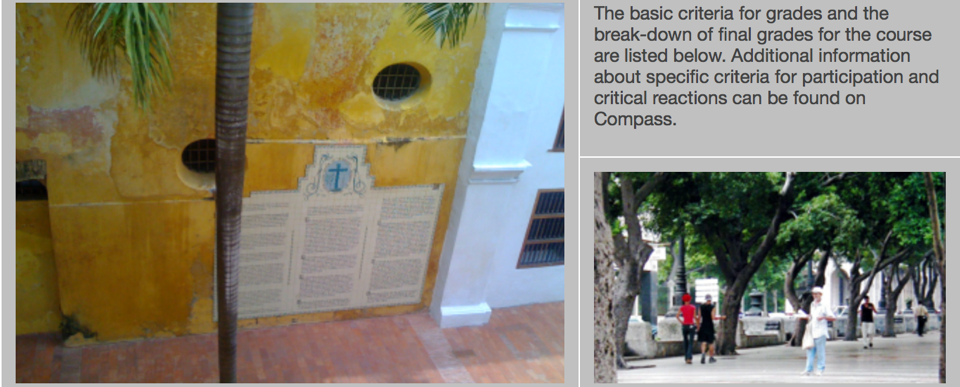
Evaluation of the Final Grade
Participation 10%
Lecture Journal 10%
Critical Reactions 40%
Exams (2) 40%

General requirements and objectives: This course depends heavily on students' thorough preparation of the assigned materials and active participation in class discussions. Throughout the semester, you will be asked to familiarize yourself with the required texts, contextual information, and critical dialogues through careful analysis of assigned readings, lectures, and additional materials. More importantly, you will be encouraged and required to develop your own critical assessment of the texts and concepts discussed in the course.
Criteria for Required Assignments
•Participation. 10% of final grade.
Although--technically--it is only worth 10% of your grade, consistent attendance, preparation and--whenever appropriate--active participation are absolutely essential to the successful completion of the course. In fact, your written work will be evaluated based on your ability to engage and interpret the fundamental issues presented through the assigned texts, lectures, and discussions.
•Lecture Journal. 10% of final grade.
You will be asked to attend and respond to 4 lectures over the course of the semester. You may attend the four lectures included in the syllabus and/or a small selection of pre-approved lectures.
For each lecture, you will be asked to identify 1-2 salient points in the lecture and describe how the lecture connects with material covered in the course.
IF you are unable to attend one or more of the pre-approved lectures, you may attend alternate academic lectures on campus. In such cases, you will need to submit the lecture (title, sponsoring unit, and abstract—if available) for approval at least one week in advance. You will also be asked to provide a brief summary of the lecture (100-200 words) in addition to the required salient points and connections with the course, described above.
•Critical Reactions. 40% of final grade.
These are exercises designed to make you think critically about specific cultural practices that are a common part of our daily lives by engagin with key concepts and analytical tools introduced in the course. There will be two Critical Reactions, each of which will focus on important issues discussed in class and covered in the readings. However, the purpose of this exercise is for you to develop your own critical positions and critical skills, not to repeat what someone else has said. What you write should represent your own ideas, which should be well reasoned and articulated. The requirements for the Critical Reactions include:
2 pages (double-spaced) -- Written in Spanish
1” margins
Times New Roman, 12 point
Your name, section, and the title of the assignment (i.e. Critical Reaction 1 or 2)
A bibliography of all cited material (MLA format)
(Images are welcome; in fact, they may prove essential in many cases.)
Requirements and evaluation criteria for each Critical Reaction can be found on Compass.
•Exam I. 20% of final grade.
You will have a “mid-term” exam, which will cover the material from Units 1 and 2 (through Gramsci). The exam will cover basic terms and concepts along with questions that ask you you to discuss the content and critical implications of assigned materials. The exam will be admiistered on or after March 10th.
•Exam II. 20% of final grade.
You will have a second exam, which will cover the material from the end of Unit 2 and all of Unit 3 along with concepts covered throughout the semester. The second exam must be completed by 11AM on Wednesday, May 11th (the official time and date of a final exam for this course, according to the Office of the Registrar).
The specific format of each exam will be discussed in class, at least one week before the exam date.